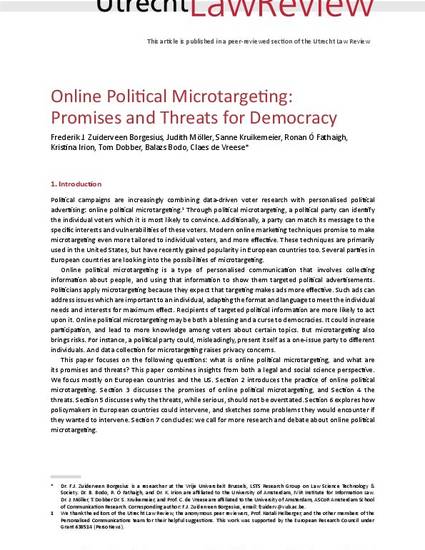
Article
Online Political Microtargeting: Promises and Threats for Democracy
Utrecht Law Review
(2018)
Abstract
Political campaigns are increasingly combining data-driven voter research with personalised political advertising: online political microtargeting. Through political microtargeting, a political party can identify the individual voters which it is most likely to convince. Additionally, a party can match its message to the specific interests and vulnerabilities of these voters. Modern online marketing techniques promise to make microtargeting even more tailored to individual voters, and more effective. These techniques are primarily used in the United States, but have recently gained popularity in European countries too. Several parties in European countries are looking into the possibilities of microtargeting.
Online political microtargeting is a type of personalised communication that involves collecting information about people, and using that information to show them targeted political advertisements. Politicians apply microtargeting because they expect that targeting makes ads more effective. Such ads can address issues which are important to an individual, adapting the format and language to meet the individual needs and interests for maximum effect. Recipients of targeted political information are more likely to act upon it. Online political microtargeting may be both a blessing and a curse to democracies. It could increase participation, and lead to more knowledge among voters about certain topics. But microtargeting also brings risks. For instance, a political party could, misleadingly, present itself as a one-issue party to different individuals. And data collection for microtargeting raises privacy concerns.
This paper focuses on the following questions: what is online political microtargeting, and what are its promises and threats? This paper combines insights from both a legal and social science perspective. We focus mostly on European countries and the US. Section 2 introduces the practice of online political microtargeting. Section 3 discusses the promises of online political microtargeting, and Section 4 the threats. Section 5 discusses why the threats, while serious, should not be overstated. Section 6 explores how policymakers in European countries could intervene, and sketches some problems they would encounter if they wanted to intervene. Section 7 concludes: we call for more research and debate about online political microtargeting.
Disciplines
Publication Date
2018
DOI
doi.org/10.18352/ulr.420
Citation Information
Frederik Zuiderveen Borgesius, Judith Möller, Sanne Kruikemeier, Ronan Ó Fathaigh, et al.. "Online Political Microtargeting: Promises and Threats for Democracy" Utrecht Law Review Vol. 14 Iss. 1 (2018) Available at: http://works.bepress.com/frederik-zuiderveenborgesius/17/